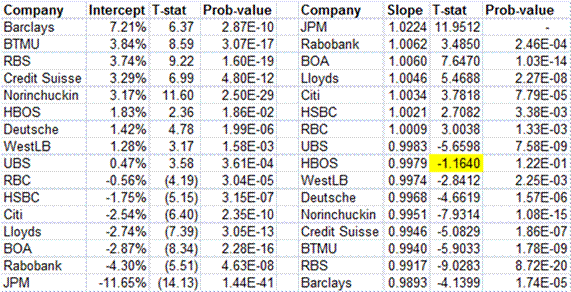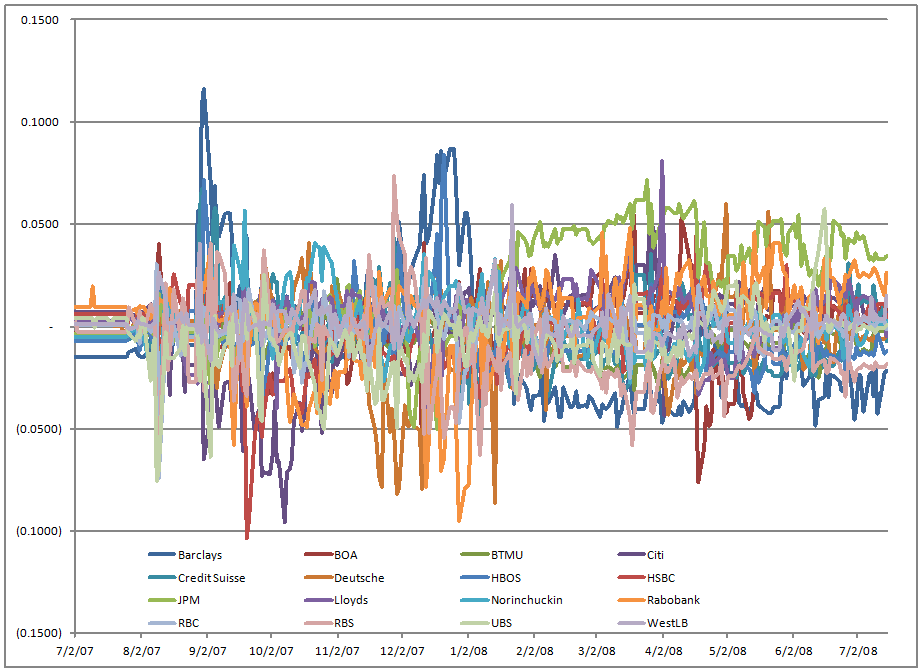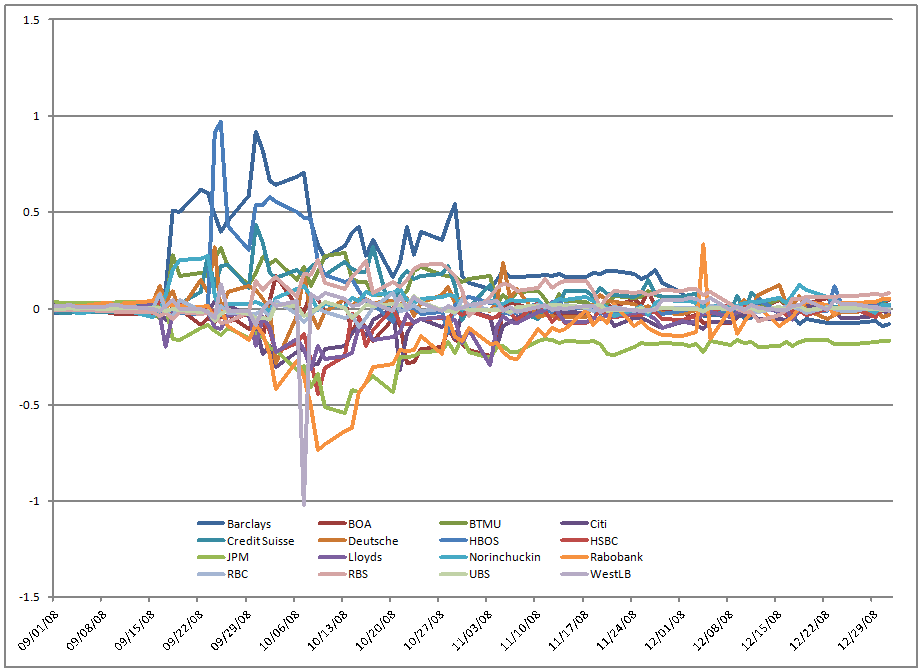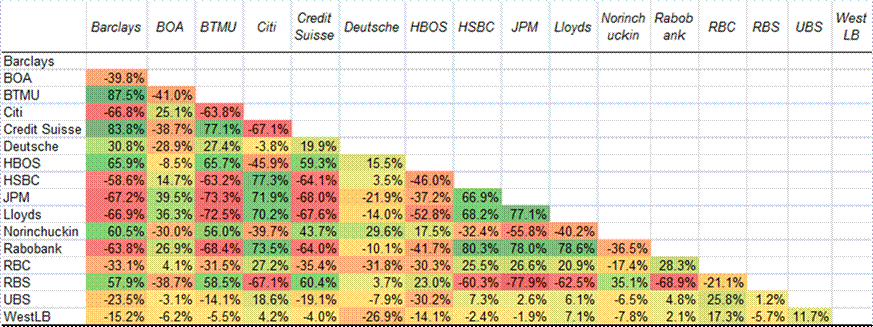Sorted Weekly Tweets
LIBOR
- Commented on The Economist | The LIBOR scandal: The rotten heart of finance $$ LIBOR may not be as rotten as advertised http://t.co/GfXH4hRq Jul 06, 2012
- LIBOR scandal: The rotten heart of finance http://t.co/g2RBmaNy Proving actual damages will b tough; don’t think this will amount2much $$ Jul 05, 2012
- Libor, central banks and financial stability http://t.co/9DBCcZaK The degree of damage from Libor-fixing is arguable; more analysis2come Jul 04, 2012
- LIBOR: Everything You Want to Know, but were Afraid to Ask http://t.co/eYwKF68v Good summary article. $$ Jul 04, 2012
Eurozone
- Europe Recalls Hamilton as Desperation Turns on the Debt http://t.co/K8RvS9dP Time running out; will EZone pull together or fly apart $$ Jul 07, 2012
- This Is A Fantastic Presentation On Why ‘Germany Is Riskier Than You Think’ http://t.co/UPcEg8yS Cost: Support Euro < Abandon Euro $$ Jul 04, 2012
- France Signals More Austerity http://t.co/gCiXPLKl Fascinating:Hollande may b delivering more conservative fiscal policy than Sarkozy $$ Jul 03, 2012
US Politics
- Obama Fails to Gain as Unemployment Stuck Since March http://t.co/vX87x6vQ W/policy unsustainable, business owners reluctant 2 hire $$ Jul 06, 2012
- Cities Consider Seizing Mortgages http://t.co/V9CKARiC Abuse of eminent domain will not hold up in court. Theft by another name. $$ Jul 05, 2012
- How Stockton went broke: A 15-year spending binge http://t.co/VGy6fWv7 Offered enhanced employee benefits, which required no cash outlay $$ Jul 05, 2012
- Thx 4 sharing this; worth the read $$ RT @LaurenLaCapra: How Stockton went broke: A 15-year spending binge | Reuters http://t.co/LK9VKq4q Jul 05, 2012
- Yes, there is a free-market alternative to Obamacare http://t.co/gOpygz04 Support high deductible insurance, even if govt has2do it4the poor Jul 04, 2012
- Who Is John…Allison? A Randian, Libertarian Business Icon Takes Over the Cato Institute http://t.co/Bms310O7 Met him @ #CMC29. Nice guy Jul 04, 2012
- Debt Forgiveness Would Revive the Economy http://t.co/D5lkF7b6 @JamesGRickards argues this, as I have elsewhere: http://t.co/LdeYyBkh $$ Jul 03, 2012
Financial Markets
- Big Board’s New Dark-Pool Ammo: Sub-Penny Quotes http://t.co/FgvZ7ebD I agree w/the guy quoted @ end; A step in the wrong direction $$ Jul 06, 2012
- The High-Frequency Conspiracy http://t.co/iOs8buSu HFT and the market makers / specialists work together to extract $$ from stock traders. Jul 04, 2012
- @TraderNewsFeed I don’t share that view; I think the GSEs deserve some blame, the Fed a lot of blame, & invt banks a lot of blame, but… $$ Jul 04, 2012
- @TraderNewsFeed Pt 2, the investors deserve blame as well. U can’t have a derivative hedge without a yield hog seeking additional income $$ Jul 04, 2012
- Tail Risk and Hedge Fund Returns http://t.co/uqcs0Bcg ht: @PragCapitalist As I have argued B4, hedge funds as a whole r short volatility $$ Jul 04, 2012
- Blackstone Makes Foray Into Houses for Rent http://t.co/UaRvTRqE Economics of managing a lot of single family houses is difficult $$ Jul 04, 2012
- Ex-JPMorgan Trader Feldstein Wins in Betting Against Bank http://t.co/pSfwA1xd This is a good example of how frenemies act on Wall Street Jul 04, 2012
- The Changing Face of U.S. Equity Ownership http://t.co/aqQXXVFF Individuals own less, Institutions more; Graph: http://t.co/gb7M6RgY Jul 04, 2012
- Stocks for Bond Lovers http://t.co/nzNrE6RA If dividends grow rapidly, a rising income stream beats bonds, if market value persists $$ Jul 04, 2012
- Pimco’s Bond King Regains Investor Favor http://t.co/MwSZ8hUu Owning long Treasuries is too fashionable, think I have2sell $TLT FD: +TLT Jul 04, 2012
- “There is a high correlation between stocks & anticipated inflation. $$ http://t.co/mKr4SFcn Aleph Blog article: http://t.co/MWBP9Ib7 Jul 03, 2012
- Pimco?s El-Erian Says US, Emerging Markets R Top Investments http://t.co/LwbYAIzs EM r in good shape, US better than other big nations $$ Jul 03, 2012
China
- For CFAs: China?s Fragile Foundations http://t.co/jwf1IJJB Fraser Howie of CLSA Asia-Pacific explains the economic weaknesses of China $$ Jul 05, 2012
- China?s New Rules May Curb Credit Growth http://t.co/KQcRe9uQ Loosen with one hand; tighten w/the other. Now that’s a monetary policy $$ Jul 05, 2012
- BRICs Priced for Economic Meltdown http://t.co/wTf6nRp9 It is the lack of “rule of law” that makes them cheap, not possible slump $$ Jul 04, 2012
- Jim Chanos ?China Makes Greece and Spain Look Like Child?s Play? http://t.co/GA2woEwn Chanos is an accounting expert; sniffs out failures $$ Jul 03, 2012
Miscellaneous
- Good for about 45 minutes as well, eh? $$ RT @BloombergNews: Central banks deliver 45-minute salvo as growth weakens http://t.co/MzlnAUXQ Jul 05, 2012
- A New Market for Schools http://t.co/HbMuSfcK Be wary; costs of the degree including foregone wages may not be worth it. $$ Jul 05, 2012
- The Green Mountain saga: a cup of joe to go http://t.co/uUPtr1Ht Once again, revenue policies take center stage for accounting quality $$ Jul 04, 2012
- Loeb’s Third Point fund moves into Chesapeake http://t.co/3yYeKOhq The plot thickens, as a group of activist investors gathers $$ Jul 04, 2012
- Contra: Carlyle Bets Big on U.S. Energy http://t.co/0bT7y1LM This does not look like a big bet to me. $$ Jul 04, 2012
- Been experimenting with a spreadsheet that takes @yahoofinance news, and weeds out the chaff, I like it; improves quality, takes work $$ Jul 03, 2012
- DNA Mapping of Alzheimer?s Patients Gives Deep Dive View http://t.co/L5M0ATIN May be promising, but not every disease is gene-based $$ Jul 03, 2012
Comments
- “It will be very difficult to prove actual damages in these cases. I don’t think this will amount to much.” http://t.co/BP18Tw8D $$ Jul 05, 2012
- “Organic growth is one of the toughest tasks in business, and also the most valuable.” ? David_Merkel http://t.co/T2MMseVx $$ $BLK Jul 05, 2012
- “W/all of that liquidity, they can buy a bigger string to push on.” ? David_Merkel http://t.co/N0EOuYnB $$ http://t.co/P456cjMP Jul 05, 2012
- “It’s lousy fiscal policy to subsidize things in oversupply, like homes and banks. No spillover?” ? David_Merkel http://t.co/AItUK466 $$ Jul 05, 2012
- On second thought, thanks to all of my Twitter followers. I am honored that you want to listen to me & I will do my best to serve you $$ Jul 05, 2012
- Many thanks to @Clarityspring, my 5,000th Twitter follower; never thought I would enjoy Twitter so much! Jul 05, 2012
- Quirky, but interesting. http://t.co/RZSAG652 Jul 04, 2012
- RE: @TheStreet_News I think all orders should be good for at least one second. Until them, I will use discretionary r? http://t.co/dxvv58RA Jul 03, 2012
- “What a fragmented market: top 10 have ~45%. Not much of a story here. Next. $$” ? David_Merkel http://t.co/nChBIcF2 $JPM $BAC $C $DBK $BARC Jul 02, 2012
- “Only one way to lower healthcare costs: move back to a first-party payer system. Individuals decide?” ? David_Merkel http://t.co/lGZaDFJW Jul 02, 2012
- “Difficult proposition: choke the economy to achieve an uncertain environmental benefit.” ? David_Merkel http://t.co/ngsN5VdG $$ Jul 02, 2012






